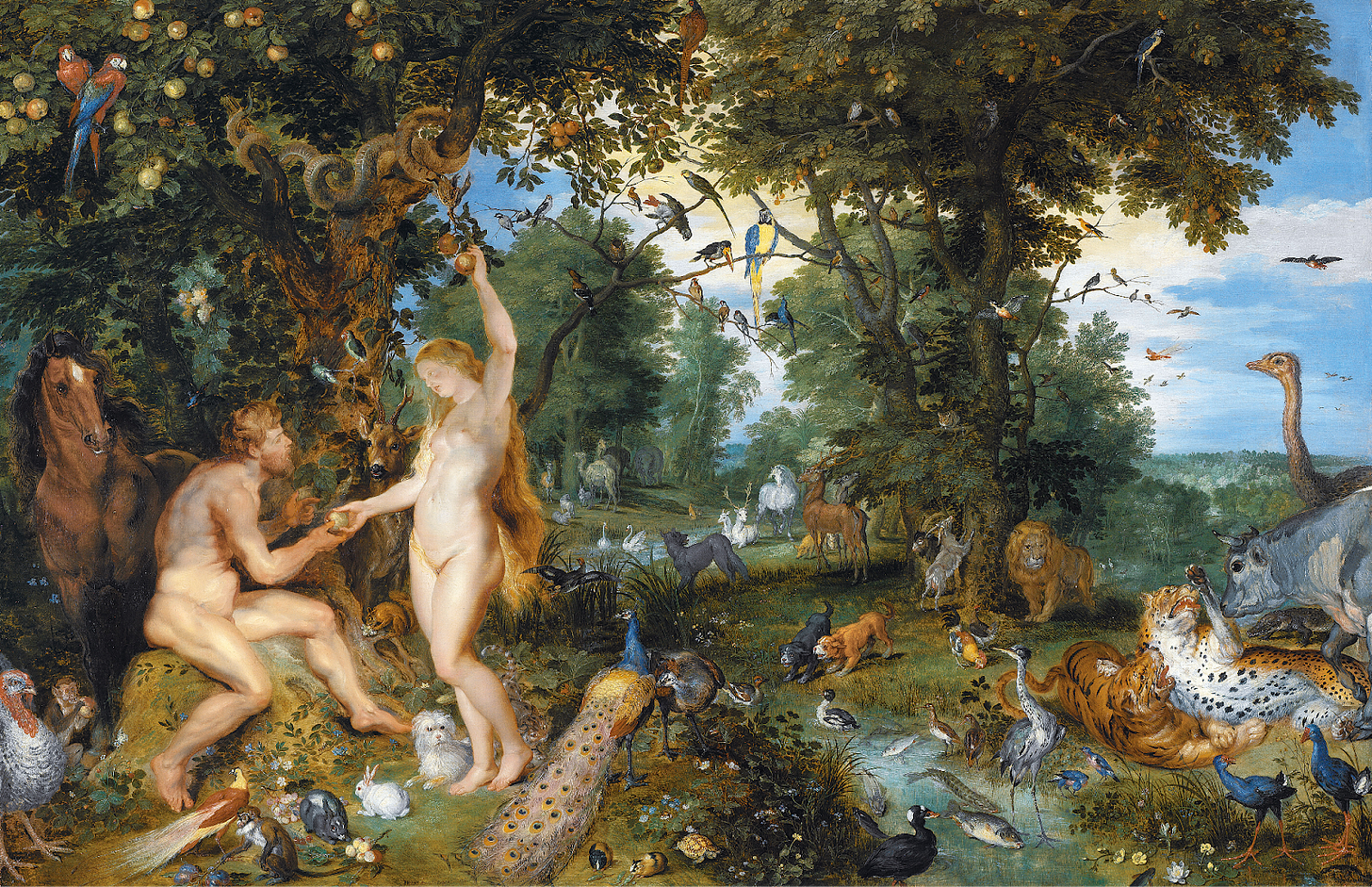Paradise lost
Really?
Adam and Eve ate from the tree of the knowledge of good and evil and were banished, with all their descendants, from Eden.
Prometheus stole fire from Olympus and gave it to mortals. He was condemned to be chained to a rock and have his liver eaten by an eagle forever.
Rousseau’s noble savage remained noble until corrupted by civilization. “Man is born free and everywhere he is in chains,” Rousseau wrote.
The theme is that humans once lived in a state of ignorant bliss. They acquired knowledge—or civilization—and lost their innocence. We have labored in sorrow since.
Anthropologists have found some basis for this theme. Peoples who lived by hunting and gathering seem to have spent much less time toiling than the farmer folks who displaced them. When hungry they hunted and gathered and ate their fill. They lazed until they got hungry again. They lived for the moment, not having figured out how to make provision for the future. They couldn’t preserve food and so felt no compulsion to hunt or gather more than they could consume at once.
Farming changed things. Farmers plant seeds today so that they might eat six months from now. They plan for the future and work toward it. They worry about the future. Their most valuable crops are those, preeminently grains, that can be stored. If storing a little is good, storing a lot is better.
The adoption of farming had adaptive value. Farmers’ surpluses tided them over times when rains failed and wild crops failed. More of farmers’ children survived. The farming populations swelled. Their armies took the lands of the hunters and gatherers, who gradually disappeared.
But the success of the farmers came at a cost. “In the sweat of thy face shalt thou eat bread,” God told Adam and Eve upon their eviction from Eden, where fruit had been had for the picking. We’ve been sweating ever since. And planning. And worrying.
Perhaps needless to say, a mythical discount has to be applied to stories of golden ages. Were hunter-gatherers really more carefree? Theodore Roosevelt once defended hunting by the reasoning that animals in a state of nature aren’t carefree but live in constant terror of being eaten by bigger animals. Death by bullet is a kinder fate than the natural alternative: being torn limb from limb and eviscerated while still breathing. Humans aren’t animals but they have often been prey of bears and wolves and other humans.
The part about working less in that state of nature does appear to be true. Great apes spend most of their time lolling around. Likewise the few hunter-gatherers who survived long enough to become subjects of anthropological research. The transition to farming effected a revolution in human activity, including a piling-on of hours spent laboring. Farmers toiled from dawn till dusk. And when farming gave way to manufacturing in the industrial revolution, factory workers toiled longer hours still, since the factories could be illuminated artificially before the sun rose and after it set. Farming slowed during the winter, but the factories hummed year-round.
Farming and civilization produced other changes. Farmers and city dwellers were sicker than hunter-gatherers. Epidemic disease requires proximity among the afflicted. The existence of surpluses produced inequalities of wealth, which gave rise to castes.
Civilization brought government. Hunter-gatherers had little of the sort. This lack was part of what put the Indian tribes at a disadvantage to settlers in America. The settlers were all of a single tribe with a unified decision process. The Indians were divided into many tribes, and even within tribes there often was no mechanism for compelling adherence to a single strategy or agenda. The white government would sign a treaty with part of a tribe, but the rest of the tribe would feel no obligation to carry out the terms of the treaty. The resulting confusion—which wasn’t always accidental—generally worked to the Indians’ disadvantage.
Which goes far toward explaining why the hunter-gatherers lost out. They couldn’t stand up to the armies of the farmers and their successors. They might have been happier, or they might not have been. But they were collectively weaker. Evolution selects not for the happy but for the strong.

